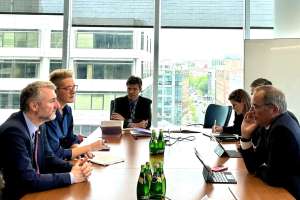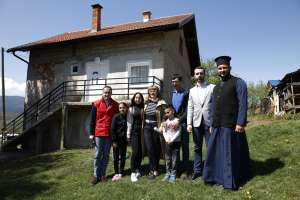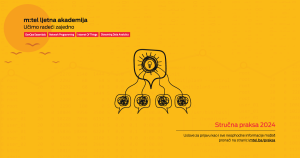SARAJEVO, December 27 (FENA) - According to a recently published World Bank report, funded by the European Union (EU), over 50% of youth are unsatisfied with their secondary education and more than 25% say that the knowledge and skills they acquired are not in line with the needs of the labor market - contributing to a youth unemployment rate of almost 47% in Bosnia and Herzegovina.
In short – the country is squandering its most important resource: its people.
Imagine you are a 19-year-old student from Bosnia and Herzegovina (BiH), excited to be looking for your first job. You have completed your studies from a technical high school – all with high marks – and you are ready to put your skills to work by taking the first step in the journey towards a fulfilling career.
Now imagine the frustration you would feel if day after day, month after month, your journey continued to be stalled when every employment opportunity ends with rejection and the sinking realization that the skills you worked so hard to learn in the initial phase of life are not the ones required for the next.
Sadly, this is the reality for many recent graduates around BiH, who learn that there is a huge gap between the skills, competencies, and knowledge they developed in school and what potential employers are looking for in an employee.
For these young applicants trying to find a place in the job market, their struggles can be traced back to their experiences with their education system.
So where does this all begin?
Bosnia and Herzegovina has one of the lowest levels of access to pre-primary education among its regional peers - only 15% of young children there have access to pre-primary education, compared to the EU average of 95%.
This is cause for great concern, considering strong global evidence of the importance of Early Childhood Education (ECE) in helping develop foundational cognitive and socioemotional skills and helping individuals escape poverty. There is a high demand from parents for quality preschool education in certain urban areas (there are waiting lists in larger towns such as Sarajevo, Banja Luka, Brčko, and Mostar), but existing infrastructure and funding are insufficient to meet this demand. In many municipalities, not a single school has a preschool program. These issues are compounded in rural areas, where higher levels of unemployment, less disposable income, and cultural norms about childrearing further limit ECE enrolment.
Education in BiH is also highly fragmented, with as many as fourteen government bodies responsible for education in a country of just 3.3 million people and 422,645 students. It’s no surprise, then, that staffing costs for officials, teachers, school leaders, and non-teaching staff account for over 90% of education spending, compared to an EU average of 77%. This leaves very little room to buy learning materials and equipment, provide training for teachers, or upgrade school learning environments.
However, even though trends in BiH show that access to pre-primary education is low, the same cannot be said for access to primary and secondary education where enrollment rates are fairly high: 90% and 77%, respectively. Despite this high access, quality in primary and secondary classrooms is lacking – with relatively low instructional time limiting opportunities to learn in comparison to other countries in the region. This difference means students miss out on the equivalent of over 100 days of schooling during their years in the classroom!
These issues of quality and relevance in education are highlighted in BiH’s recent participation in the Program for Student Assessment (PISA), which tests 15-year-old students on their proficiency in reading, math and science. BiH participated in PISA for the first time and the results show that between 50-60% of the students that participated are ‘low performers.’ This means more than half of the students failed to demonstrate basic competencies required for reading, math and science, compared to an average of 31% of students in the Europe and Central Asia (ECA) region and 24% in the EU.
And what about teachers?
Teachers are the heart of any education system. In BiH, teaching has become a relatively unappealing profession, in part due to the difficult working conditions in many schools. Teachers’ salaries are on par with the public sector, and nearly 25% higher than average private sector salaries. However, this varies drastically across the country. It is important to note that teacher pay in BiH is also linked to educational qualifications and years of experience - factors that are not necessarily linked to improving student learning. There are limited opportunities for professional development and growth, while pedagogical institutions have limited capacity - leading to a high dependence on programs supported by donors and NGO’s. Principals, who should be spending time supporting teachers, focus not on instructional leadership, but on administrative duties.
It is no wonder then, that Bosnia and Herzegovina ranks just 58 out of 157 countries in the World Bank’s Human Capital Index. Human capital consists of all the knowledge, skills and well-being that people accumulate throughout their lives, enabling them to realize their potential as productive members of society. In BiH, this means that as children grow up, they will only be 62% as productive they could be if they enjoyed a complete education and full health – compared to 72% and 76% in neighboring Croatia and Serbia, respectively. This loss of potential harms the country in the long-term and threatens its EU accession goals.
So how does one build human capital?
The 2018 World Development Report emphasizes the fact that the quality of learning matters most for developing quality human capital. This means that improving the quality of teaching and learning in classrooms and schools around the country is the pathway to increasing human capital and unlocking the growth potential of all students in Bosnia and Herzegovina. To do this, it is important that the country prioritizes education through three key approaches:
Assess learning to make it a serious goal. The results of the Program for International Student Assessment (PISA) for BiH will help “turn the light on” for learning, but much more could be done to support harmonized learning assessments.
Act on evidence to make schools work for all learners. More information on good practices in BiH and beyond could help guide innovation and interventions at the local level.
Align actors to make the whole system work for learning. Coordination of policies and actions that affect teachers, school management, school inputs, and learners are imperative to improve learning.
One education official in BiH recently observed that “education has been seen as something to be consumed or spent on as opposed to something to invest in. For students around the country, investments in education are exceptionally important – allowing them to access opportunities and grow to their full potential," stated the World Bank Office in BiH.
(FENA) S. R.











